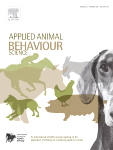Document type: Scientific article published in Scientific Reports
Authors: Núria Mach, Léa Lansade, David Bars-Cortina, Sophie Dhorne-Pollet, Aline Foury, Marie-Pierre Moisan, Alice Ruet
Preview: Elite horse athletes that live in individual boxes and train and compete for hours experience long-term physical and mental stress that compromises animal welfare and alters the gut microbiota. We therefore assessed if a temporary period out to pasture with conspecifics could improve animal welfare and in turn, favorably affect intestinal microbiota composition. A total of 27 athletes were monitored before and after a period of 1.5 months out to pasture, and their fecal microbiota and behavior profiles were compared to those of 18 horses kept in individual boxes. The overall diversity and microbiota composition of pasture and control individuals were temporally similar, suggesting resilience to environmental challenges. However, pasture exposure induced an increase in Ruminococcus and Coprococcus that lasted 1-month after the return to individual boxes, which may have promoted beneficial effects on health and welfare. Associations between the gut microbiota composition and behavior indicating poor welfare were established. Furthermore, withdrawn behavior was associated with the relative abundances of Lachnospiraceae AC2044 group and Clostridiales family XIII. Both accommodate a large part of butyrate-producing bacterial genera. While we cannot infer causality within this study, arguably, these findings suggest that management practices maintained over a longer period of time may moderate the behavior link to the gut ecosystem beyond its resilience potential.






